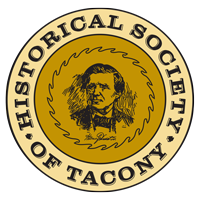
On March 27, 1911, a great storm swept over Philadelphia, striking several neighborhoods from the Southeast to the Northwest. But it was in Tacony that most of the damage was felt. At about 6:30 that evening, Tacony residents noticed a darkening in the sky. Some ran for cover, while others stepped out of their homes to investigate. Still others, like the congregation gathered at St. Leo’s that evening, weren’t prepared to react at all. Unfortunately for Tacony, this was more than a thunderstorm. It was a tornado!
The majority of the damage felt in Tacony was on or near State Road and Keystone Street, especially along the trolley and train lines. Several people were waiting for a train at the Tacony Station of the Pennsylvania Railroad when the tornado touched down, ripping a shed up from the ground across the street and sending it flying towards them. As the crowd ran to escape, Richard Leahy, a hammer-man for the Disston Saw Works, was still in the doorway when an end of the shed struck him on the side and buried him in the wreckage. It was considered a miracle that his was the only death caused by the tornado, though there were several serious injuries in Tacony and the rest of the city.
In the days immediately following the storm, newspapers found it difficult to accurately report on damage and injuries. Leahy, for example, was originally incorrectly identified as George Dolan, a man traveling from Pittsburgh who did actually survive the storm. Homes all over the city, especially in Tacony, Manayunk, and Kensington, were unroofed and the families inside injured. The Bushnell family, for example, on State Road, all suffered broken bones and contusions when a portion of their home collapsed on them. A trolley car full of people near Unruh Street found themselves suddenly caught between the flying roof of the Tacony Ball Park and a large piece of lumber from the Delaney & Company glue factory at Unruh and State Road. Passengers were crouched on the floor when they noticed the flying debris and realized they would be struck, but the car was hit and nearly forced off the tracks before they could escape. Several people were injured and had to be dug out of the wreckage by their fellow passengers.
A different kind of tragedy struck at St. Leo’s Roman Catholic Church, where the congregation was gathered for worship when the storm made itself known. A great stained-glass window from the front of the building was ripped out of its frame and sent flying down onto the heads of the worshippers in the pews. As they attempted to escape, they found themselves assailed by flying chunks of large glass. Fortunately, there were no serious injuries in that incident, but the window had been a gift from a Philadelphia philanthropist and its loss was sorely felt. Altogether, the costs from the storm throughout the city were estimated at about a million dollars, with about $200,000 of that coming from damages in Tacony.
After the storm, Philadelphians searched for an explanation. Local weather forecaster George S. Bliss explained that the tornado could be attested to dramatic temperature fluctuations in the days prior. The warm weather one day and cold weather the next caused a warm area of air to form below a cold atmosphere. The warm air pushed up into the cold, eventually forming a vacuum which formed as a tornado near the surface of the Earth.
Despite damages, the spirit of Tacony was not broken. Relief efforts began almost immediately, spearheaded by the firm of Henry Disston & Sons and the Mary Disston Estate. The organizations appointed a Relief Committee responsible for investigating cases of large losses, especially to those who couldn’t afford repairs, and awarding financial aid to relieve suffering and aid in repairing homes. The Kensington Driving Club also assisted by donating the entire gate receipts from the four races held on Easter Monday. Tacony rebuilt, but it did not forget the greatest storm the neighborhood had ever seen!
The Tornado of 1911
Gallery

